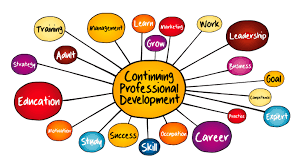Professional development is a crucial aspect of career growth and success. It refers to the continuous process of learning and improving skills, knowledge, and abilities that are relevant to one’s profession. It involves acquiring new skills, expanding existing ones, and staying up-to-date with the latest trends and developments in the industry.
Professional development is essential for several reasons. Firstly, it helps individuals stay competitive in their respective fields. In today’s fast-paced world, industries are constantly evolving, and new technologies and methods are emerging. By continuously learning and improving their skills, professionals can stay ahead of the curve and remain relevant in their industry.
Secondly, professional development provides opportunities for career advancement. Employers value employees who are committed to their professional growth and development. By acquiring new skills or certifications, individuals can increase their value to their organization and become more eligible for promotions or higher-paying job opportunities.
Thirdly, professional development enhances job satisfaction. Engaging in activities that promote personal growth can be rewarding on a personal level. It can help individuals feel more fulfilled in their careers by providing a sense of purpose and accomplishment.
There are several ways to engage in professional development activities. Attending conferences or workshops related to one’s field is an excellent way to learn about new trends or techniques. Online courses or webinars provide flexibility for individuals who may not have the time or resources to attend in-person events.
Mentorship programs offer another opportunity for professional development by connecting individuals with experienced professionals who can provide guidance and support as they navigate their careers.
In conclusion, professional development is an ongoing process that requires commitment and dedication. It offers numerous benefits such as staying competitive in your field, advancing your career prospects, enhancing job satisfaction, among others. By investing time and resources into your professional growth, you can achieve your goals while also contributing positively to your organization’s success.
Answers to Common Questions About Professional Development
- What are 3 main ideas and professional development?
- What are professional development skills?
- What is the purpose of professional development?
- What are the five stages of professional development?
What are 3 main ideas and professional development?
Here are three main ideas related to professional development:
Continuous learning: Professional development is a process of continuous learning that involves acquiring new skills, knowledge, and abilities relevant to one’s profession. It is an ongoing process that requires individuals to stay up-to-date with the latest trends and developments in their industry.
Career advancement: Professional development provides opportunities for career advancement by increasing an individual’s value to their organization. By acquiring new skills or certifications, individuals can become more eligible for promotions or higher-paying job opportunities.
3. Job satisfaction: Engaging in activities that promote personal growth can enhance job satisfaction by providing a sense of purpose and accomplishment. By investing time and resources into their professional growth, individuals can feel more fulfilled in their careers and contribute positively to their organization’s success.
What are professional development skills?
Professional development skills refer to the abilities, knowledge, and competencies that individuals acquire and develop to enhance their career growth and success. These skills are essential for individuals who want to stay competitive in their respective fields and advance their careers.
Some examples of professional development skills include:
- Communication Skills: Effective communication skills are crucial in any profession. Professionals must be able to communicate clearly, concisely, and persuasively with clients, colleagues, and stakeholders.
- Leadership Skills: Leadership skills involve the ability to inspire, motivate, and guide others towards achieving a common goal. Professionals must be able to lead teams effectively and make decisions that benefit the organization.
- Time Management Skills: Time management skills involve the ability to prioritize tasks efficiently and effectively manage one’s time to meet deadlines.
- Technical Skills: Technical skills refer to the specific abilities required in a particular profession or industry. For example, software programming for IT professionals or financial analysis for accountants.
- Problem-Solving Skills: Problem-solving skills involve the ability to identify problems, analyze them critically, and develop effective solutions.
- Adaptability: Adaptability refers to the ability to adjust quickly to new situations or changing circumstances in the workplace.
- Emotional Intelligence: Emotional intelligence involves understanding one’s emotions as well as those of others in order to build strong relationships with colleagues and clients.
In conclusion, professional development skills are essential for individuals who want to succeed in their careers. By continuously developing these skills through training programs, mentorship opportunities or on-the-job experience individuals can enhance their value as professionals while also contributing positively towards organizational success.
What is the purpose of professional development?
The purpose of professional development is to enhance and improve the skills, knowledge, and abilities of individuals in their respective professions. The goal is to provide opportunities for individuals to acquire new skills, expand existing ones, and stay up-to-date with the latest trends and developments in their industry.
Professional development is essential for several reasons. It helps individuals stay competitive in their field by providing them with the tools they need to remain relevant in a constantly evolving job market. It also offers opportunities for career advancement by increasing an individual’s value to their organization through the acquisition of new skills or certifications. Additionally, professional development enhances job satisfaction by promoting personal growth and providing a sense of purpose and accomplishment.
Ultimately, the purpose of professional development is to support individuals in achieving their career goals while contributing positively to the success of their organization. By investing time and resources into professional development activities, individuals can improve their performance on the job, increase their earning potential, and contribute positively to their organization’s overall success.
What are the five stages of professional development?
The five stages of professional development are:
- Novice: This is the stage where individuals are new to their profession and lack experience. They require guidance, training, and support to develop their skills and knowledge.
- Advanced beginner: At this stage, individuals have gained some experience in their profession but still require direction and supervision from more experienced colleagues.
- Competent: Individuals at this stage have developed a level of proficiency in their profession and can perform tasks independently with minimal supervision.
- Proficient: At this stage, individuals have mastered their profession and can perform tasks with ease and efficiency. They can also mentor others who are at earlier stages of development.
- Expert: Individuals at this stage have achieved a high level of mastery in their profession and are recognized as leaders in their field. They possess advanced skills, knowledge, and expertise that allow them to innovate, solve complex problems, and contribute significantly to the advancement of their industry.
It’s important to note that not everyone progresses through these stages at the same pace or in a linear fashion. Some individuals may move through the stages quickly while others may take longer to develop. Additionally, there may be setbacks or challenges along the way that can impact one’s progress through these stages. However, by committing to continuous learning and growth, individuals can advance through these stages and achieve success in their careers.



